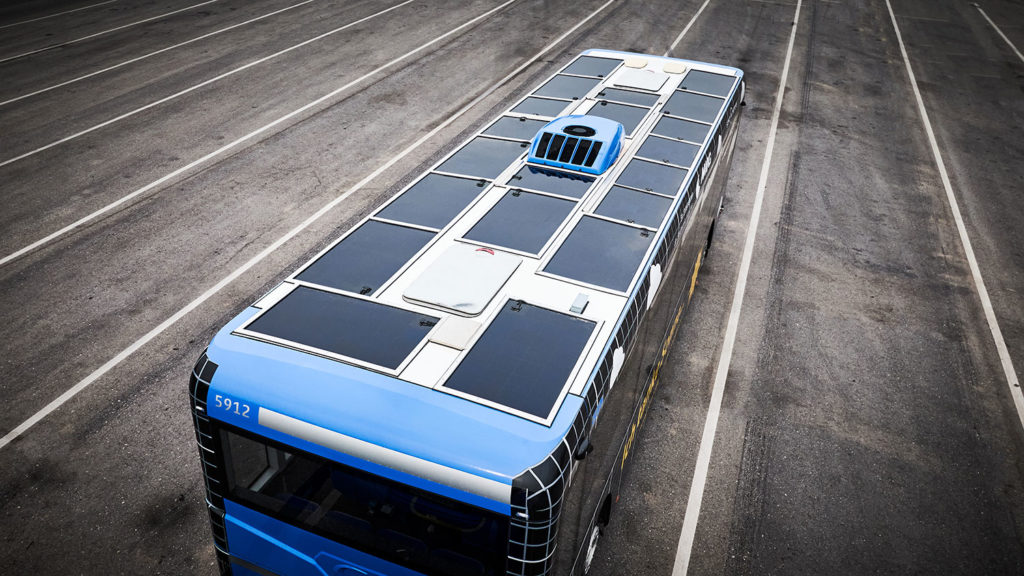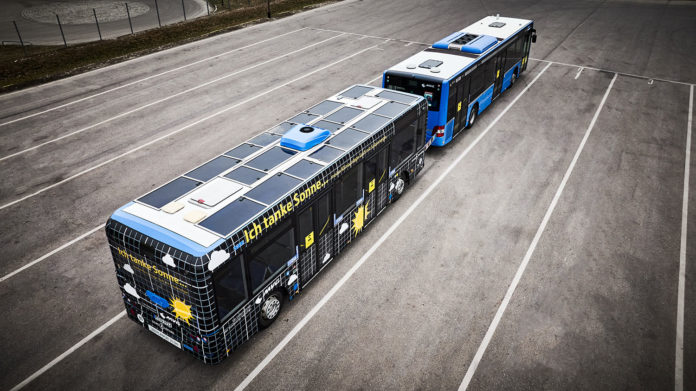A German startup Sono Motors has partnered with the Münchner Verkehrsgesellschaft (Munich Transport Company, MVG) to launch its proprietary solar technology to public transport for the first time. In the near future, the novel solar bus trailer will hit the roads in the Munich metropolitan area, testing the energy yields as well as the potential of the technology in daily operation.
Around 20 semi-flexible special photovoltaic (PV) modules will be installed on the roof of a bus trailer that will drive across the city behind a regular bus operated by MVG. The modules cover a total area of twelve square meters and supply the 24 V battery with over 2,000 watts to power the vehicle’s battery and electrical loads such as heating, ventilation, and air conditioning, as well as the trailer’s steering system.
“The partnership with MVG illustrates the enormous potential of our unique solar technology, which is now being used for the first time in the company’s history on public transport. This is a milestone in Sono Motors’ mission to make every vehicle solar”, says Laurin Hahn, Sono Motors co-founder, and CEO. “Especially in times of rising energy prices and increasing urban area emission regulations, our solar technology offers great added value for public transport operators. City buses and coaches, whether electric or diesel-powered, offer a lot of space and are out on the road every day. The first solar bus trailer for MVG will hit the streets of Munich in the future and allow MVG passengers to experience solar mobility in daily use.”

The CO2 saving potential of solar-powered vehicles and their contribution to urban air pollution control and climate protections are promising. The company estimated that the technology could offer possible savings of up to 2,500 liters of diesel per year and an annual local CO2 saving potential of more than 6.5 metric tonnes per bus. Calculations show the possibility of savings of up to 2,000 metric tonnes of CO2 per year for a medium-sized fleet of around 300 buses.
Further increases are conceivable in the future, as both solar cells and power electronics are expected to become more efficient. This solar solution’s so-called ‘CO2 backpack’ i.e., emissions caused in production, amounts to a one-off of approximately 1.5 metric tonnes of CO2 per bus or bus trailer and could be offset after a short runtime of just less than one year.
Sono Motors’ patented solar technology has been developed so that it can be integrated and licensed into a wide range of vehicles. “When e-buses are factory-equipped with our solar technology, the additional range can immediately be generated through solar energy on the roof and sides. This not only reduces the standstill times for charging processes but also protects the battery through a constant charging process. As a result, the e-bus can be operated longer,” explains Hahn.
“We need a change of course in the transport sector. Transport still misses the climate protection targets by a very wide margin, and this also has a direct impact on air quality in Munich. Solar buses can be a cornerstone in this urgently needed change towards climate-friendly mobility. I am convinced by the idea, as a lot of fuel can be saved here, and CO2 emissions can be significantly reduced,” Munich’s vice mayor, Katrin Habenschaden, said.
“We are already working with MVG to completely convert our bus fleet to electric drives. Harnessing the power of the sun is, of course, even more sustainable, and I hope that this pilot project will show that we can also extend the range of the e-buses using solar energy. I am particularly pleased about this cooperation with our MVG that such an innovative idea comes from a Munich-based company.”
Sono Motors says the bus trailer will go into regular service and be experienced by all Munich residents after technical approval by supervisory authorities.
